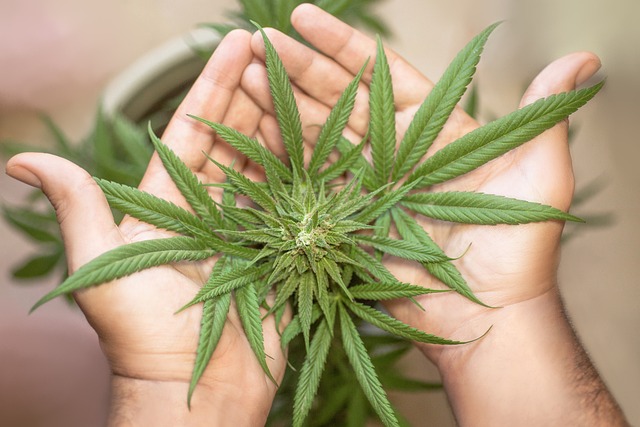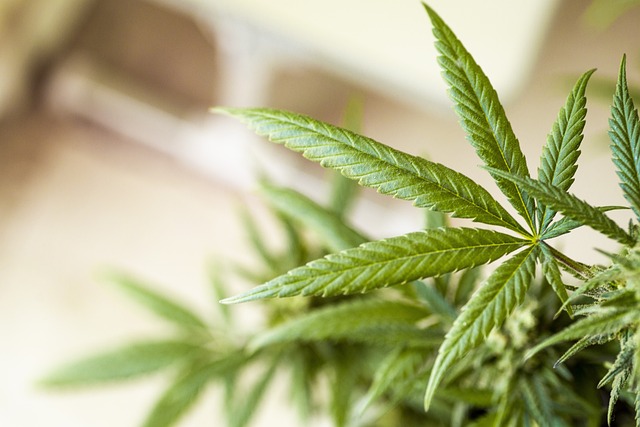2023 marked a significant shift in Australia's approach to cannabinoids with the emergence of THCA (Tetrahydrocannabinolic Acid) flower as a legal entity in certain states. Unlike its psychoactive cousin THC, THCA is non-psychoactive and has garnered attention for its potential health benefits, including anti-inflammatory and anxiolytic properties. Research suggests that THCA engages with the endocannabinoid system, offering relief from pain and stress without intoxication risks. The legal landscape is diverse, with THCA's legality varying by state, necessitating careful navigation of local regulations. While some states allow THCA for medical purposes under a prescription, others have incorporated it into hemp products within specific research frameworks, adhering to the Therapeutic Goods Administration's guidelines. As interest grows, healthcare professionals and patients alike must stay informed about the evolving legal status of THCA across Australia to harness its therapeutic potential responsibly. Keywords: thca legal in Australia states.
Discover the transformative potential of THCA flower, a non-psychoactive compound found within the hemp plant that’s gaining attention for its myriad health benefits. As we delve into the science and applications of this emerging wellness ingredient, we explore its legal status and availability across various Australian states, making it an accessible option for those seeking natural relief and improved quality of life. From its anti-inflammatory properties to its role in managing anxiety, THCA’s benefits are broad, affecting brain health, skincare, gastrointestinal function, and more. This article provides a comprehensive guide to understanding THCA flower, its effects when combined with other cannabinoids, and how it can be legally sourced and used within Australia’s states. Join us as we navigate the future of THCA research and its growing role in Australia’s health market.
- Unveiling the Potential of THCA Flower: A Legal Option in Australia's States
- The Science Behind THCA: What Makes It Beneficial?
- THCA Flower Benefits: An Overview
- Anti-Inflammatory Properties and Pain Relief
- THCA's Role in Anxiety and Stress Management
- Neuroprotective Effects of THCA: Implications for Brain Health
Unveiling the Potential of THCA Flower: A Legal Option in Australia's States

2023 has seen a significant shift in the perception and regulation of cannabis-related products within Australia’s states, particularly with the emergence of THCA (Tetrahydrocannabinolic Acid) flower as a legal alternative. Unlike its psychoactive counterpart THC (Tetrahydrocannabinol), THCA is non-psychoactive and is found in raw cannabis plants before it is heated or decarboxylated. This distinction has piqued the interest of researchers and consumers alike, as Australia’s states explore the potential benefits of THCA flower.
Incorporating THCA flower into one’s wellness routine is gaining traction among those looking for natural alternatives to manage various health conditions. The legal status of THCA flower varies by state in Australia, with some having specific regulations that allow for its use, possession, and cultivation for medicinal or personal use within certain limits. This variability underscores the importance of understanding the local legislation before engaging with THCA products. As research continues to unveil the potential therapeutic properties of THCA, including its anti-inflammatory and neuroprotective effects, many are turning to this legal cannabinoid as a safe and beneficial addition to their health regimen, compliant with Australia’s state laws.
The Science Behind THCA: What Makes It Beneficial?

Delta-9-tetrahydrocannabinolic acid (THCA) is a cannabinoid found in the Cannabis sativa plant that has garnered significant attention for its potential therapeutic properties. While THCA is the precursor to delta-9-tetrahydrocannabinol (THC), the psychoactive component of cannabis, THCA itself is non-psychoactive. This distinction makes it an object of study for those seeking the medicinal benefits without the ‘high’ associated with THC. In Australia, the legal status of THCA-rich products varies by state and territory, with some allowing certain forms of cannabis for medical and/or research purposes.
The science behind THCA’s potential health benefits is rooted in its interaction with the body’s endocannabinoid system. This system plays a crucial role in regulating a range of functions and processes, including pain, inflammation, and immune response. Studies have suggested that THCA may possess anti-inflammatory, anti-nausea, anti-emetic (anti-vomiting), and neuroprotective properties. Its therapeutic potential is being explored for conditions such as chronic pain, multiple sclerosis, nausea from chemotherapy, and more, offering a natural alternative to conventional treatments. The legal landscape in Australia continues to evolve, with ongoing research and legislative changes reflecting the growing body of evidence supporting the benefits of THCA-rich products within the context of medical and wellness applications.
THCA Flower Benefits: An Overview

Cannabidiolic acid (THCA) is a non-psychoactive compound found in the cannabis plant that has garnered attention for its potential therapeutic properties. In certain Australian states where cannabis regulations allow for such use, THCA-rich flowers are being recognized for their health benefits. These benefits include anti-inflammatory, analgesic, and neuroprotective effects, which may be beneficial for conditions ranging from chronic pain to neurological disorders. Advocates and researchers suggest that THCA could have a broader spectrum of effects than its psychoactive counterpart, delta-9-tetrahydrocannabinol (THC), without the mind-altering side effects. As legal frameworks continue to evolve in Australia, the exploration of THCA flower’s advantages is becoming increasingly prominent within the scientific and medical communities. The interest in THCA as a natural remedy stems from its unique interaction with the body’s endocannabinoid system, which may influence various physiological processes. Users in states where THCA flowers are legal report anecdotal evidence of improved well-being, reduced pain, and enhanced mood without the high typically associated with cannabis use, highlighting the growing interest in this cannabinoid’s potential health benefits.
Anti-Inflammatory Properties and Pain Relief

THCA, or Tetrahydrocannabinolic Acid, is a cannabinoid found in the Cannabis sativa plant that has garnered attention for its potential health benefits. One of the notable properties of THCA is its anti-inflammatory effects. Studies suggest that THCA can inhibit certain enzymes and receptors linked to inflammation, making it a promising compound for those seeking natural ways to manage inflammatory conditions. In states within Australia where THCA-rich hemp products are legal, consumers have access to these potential anti-inflammatory agents without the psychoactive effects associated with THC, its decarboxylated form. This legality is crucial for individuals who wish to utilize cannabinoids for therapeutic purposes without any mind-altering side effects. Furthermore, the pain-relieving properties of THCA are also being explored. It interacts with the body’s endocannabinoid system by binding to CB1 and CB2 receptors, which may help in alleviating various types of pain, from neuropathic to chronic discomfort. The anti-inflammatory and analgesic effects of THCA are not only of scientific interest but also offer practical applications for those in Australia’s legal states who seek natural remedies for pain management, providing a promising alternative to conventional medications.
THCA's Role in Anxiety and Stress Management

1. THCA, or Tetrahydrocannabinolic Acid, is a non-psychoactive cannabinoid found in the Cannabis sativa plant and is precursor to THC, the primary psychoactive component of cannabis. Research indicates that THCA may offer therapeutic benefits, particularly in the realm of anxiety and stress management. In Australia, where the legal status of cannabis derivatives varies by state and territory, THCA’s potential uses are a subject of growing interest among researchers and health professionals. Preclinical studies suggest that THCA interacts with the body’s endocannabinoid system, which plays a significant role in regulating mood and stress responses. By binding to cannabinoid receptors, particularly CB1 receptors found primarily in the brain, THCA may help modulate serotonin levels and reduce anxiety symptoms without the psychoactive effects associated with THC. This makes it a promising compound for those seeking natural alternatives to manage their mental well-being.
2. The legal landscape of THCA in Australia is complex, with different states and territories having distinct regulations regarding cannabis and its derivatives. In some jurisdictions, THCA may be legally accessible as part of hemp products or research programs, provided it complies with the stringent guidelines set forth by the Therapeutic Goods Administration (TGA). Users interested in exploring THCA for anxiety and stress management should first consult with healthcare providers to ensure compliance with local laws and regulations. Additionally, anecdotal evidence and emerging scientific research support the notion that THCA may possess anxiolytic properties, potentially aiding in the alleviation of stress and anxiety without inducing intoxication. As such, it represents an area of intriguing potential for natural health interventions, though more clinical studies are warranted to fully understand its efficacy and optimal dosing.
Neuroprotective Effects of THCA: Implications for Brain Health

Delta-9-tetrahydrocannabinolic acid (THCA) is a non-psychoactive cannabinoid found in the Cannabis sativa plant, which has garnered attention for its potential therapeutic properties. One of the notable benefits of THCA is its neuroprotective effects, which are of particular interest in the context of brain health. Studies suggest that THCA may offer protection against neurodegenerative diseases by inhibiting the production of amyloid-beta peptides, a key component in Alzheimer’s disease pathology. Furthermore, THCA has been observed to modulate the activity of certain neurotransmitters, such as anandamide, which plays a role in mood regulation and pain management.
In Australia, the legal status of THCA-containing products varies by state and territory, with some allowing for its use under specific conditions. For instance, in states like New South Wales and Victoria, cannabis products with low THC content are legal for medical purposes with a prescription. The neuroprotective potential of THCA is an area of ongoing research, with implications that could significantly impact the treatment of neurological disorders. As such, understanding the legality and therapeutic applications of THCA in Australia’s various states is crucial for healthcare providers and patients seeking alternatives for brain health management.
THCA, or tetrahydrocannabinolic acid, has emerged as a subject of interest within the health and wellness spheres, particularly in Australia where its legal status varies by state. This article delves into the multifaceted benefits of THCA flower, a non-psychoactive compound found in hemp and cannabis plants, which offers a legal alternative for those seeking its potential therapeutic effects. The scientific exploration of THCA’s properties reveals its anti-inflammatory capabilities, its role in alleviating pain, its contributions to anxiety and stress management, and its neuroprotective potential. These findings underscore the importance of further research into THCA’s benefits as a natural remedy, especially within the legal framework of Australia’s states. As legislation continues to evolve, understanding THCA’s legal status and its promising health implications becomes increasingly pertinent for those exploring alternative wellness solutions.
